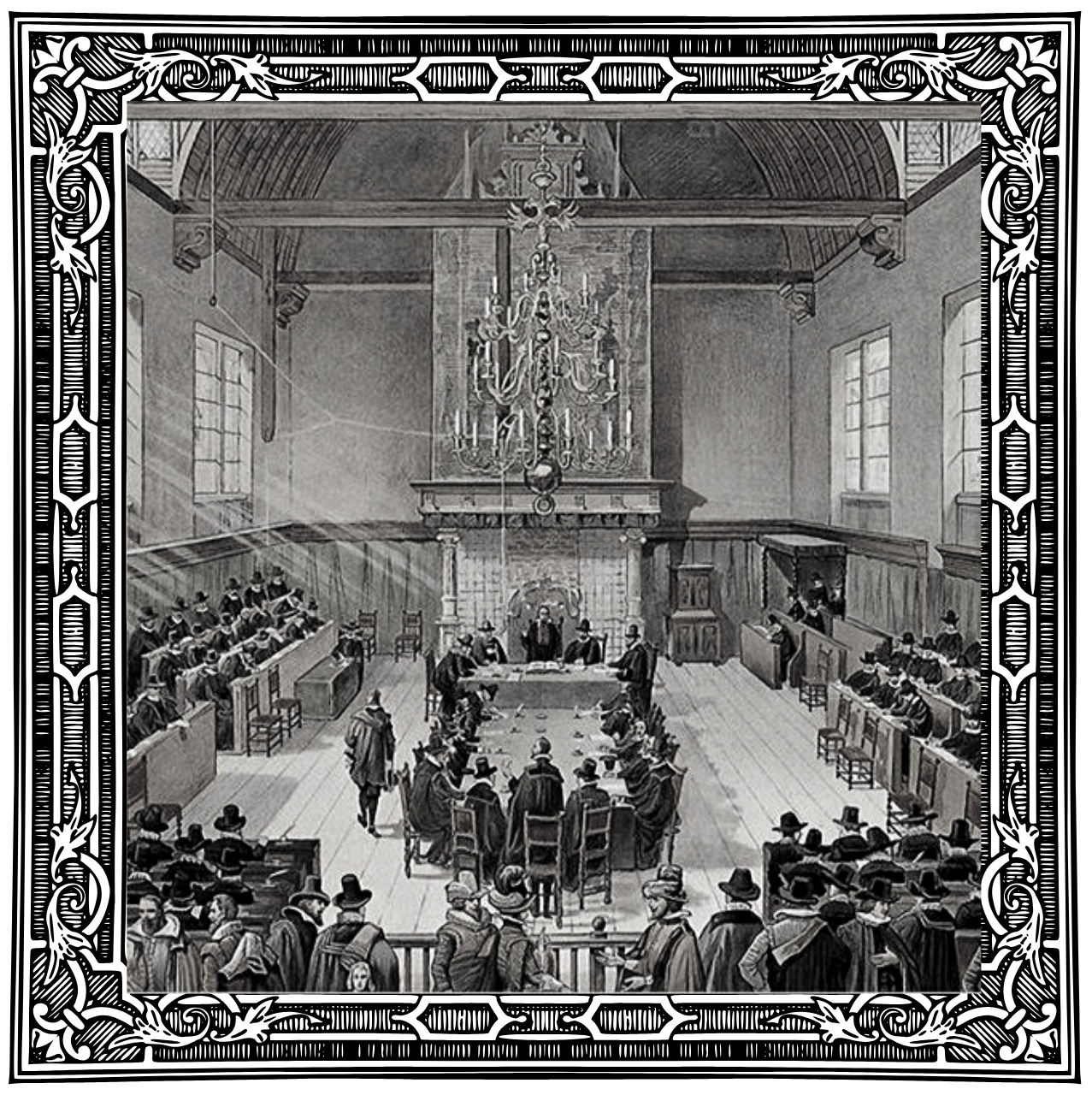Creation proclaims the glory of God: “The heavens declare the glory of God” (Ps. 19:1). Another not as well known Psalm says, “The heavens proclaim his righteousness, and all the peoples see his glory” (Ps. 97:6). Creation proclaim this glory on a grand scale. But what in the Old Testament demonstrates the Lord’s glory most clearly? For that we turn again to the events of the exile and exodus. We turn our hearts and minds to God’s glory in the sea.
Stories have an introduction, plot, and conclusion. Exodus’ introductory scene describes Israel’s languishing under the antagonist Pharaoh’s slavery (chaps. 1–2). Then the protagonist Moses rises. He goes from the pitch-covered ark to the palace of Egypt (chaps. 1–2). The plot is the dramatic tension building up between Moses and Aaron on the one hand and the Pharaoh and his magicians on the other. This happens during the ten plagues on Egypt (chaps. 7–12). Finally, the climactic conclusion: the Red Sea. Exodus is a story that proclaims the dramatic high point of Israel’s life as a nation. As they left Egypt for the wilderness, we read of the glory of God in the pillar of cloud and fire (13:21–22). Later we’re told these hovered over Israel (Num. 10:11–12) and led them (Neh. 9:11–12, 19).
The Glory of His Wisdom
God’s glory in the Sea demonstrates his wisdom. As Israel journeyed out of Egypt they encamped at Etham (Ex. 13:20). But then the Lord told them to “turn back” so they’d be encamped “by the sea” (Ex. 14:2). Why would the Lord want his people to go backward, towards Egypt? Very simply: so that Pharaoh would see it and say “they are wandering in the land; the wilderness has shut them in” (Ex. 14:3). In his wisdom, the Lord wanted to draw Pharaoh and the armies of Egypt out into the wilderness as well for a dramatic battle. He had just engaged in ten battles with the gods of Egypt in the plagues (Ex. 12:12; Num. 33:4). Now he would get the glory by battling Pharaoh himself, a self-proclaimed god in the flesh.
Yet, we can imagine the Israelites thinking to themselves, “Wisdom? What wisdom?” We go on to read, “When Pharaoh drew near” Israel “feared greatly” (Ex. 14:10). This fear was a manifestation that Israel did not completely trust in the Lord who had just liberated them. So we hear their famous complaint: “Is it because there are no graves in Egypt that you have taken us to die in the wilderness?” (Ex. 14:11)
Pharaoh saw foolish behavior by Israel. Israel saw foolish leadership by Moses. We see by faith as the wisdom of the Lord. Just as he didn’t lead Israel out of Egypt by the quickest route through the Philistines’ land (13:17–18), so too he leads them in what seems to be the wrong route. This shouldn’t surprise us. He’s been doing this for some time.
Back when Abram and Lot reached the precipice of the land in Genesis 13, Abram let Lot take the best part of the land like Eden, while Abram took what was left. Yet there the Lord reiterated his promise to Abram that all the land would belong to him (Gen. 13:14–18). The glory of God in the Red Sea demonstrates his wisdom. We need to come to grips with that. Hear and believe the wisdom of the Lord. For example, after calling upon his people to come without any money but to buy food and drink, the Lord said through Isaiah, “For my thoughts are not your thoughts, neither are your ways my ways, declares the Lord. For as the heavens are higher than the earth, so are my ways higher than your ways and my thoughts than your thoughts” (Isa. 55:8–9).
We need to come to appreciate the Lord’s wisdom in how he works. Learn to align your expectations with his. The whole way God works seems unwise. Why did he allowed Adam to sin? How does he redeem us in Christ? How did he bring you to faith? Every little detail of your life that you question “why God” is according to his wisdom, for his glory. The prophet Isaiah used the Red Sea theme to comfort the people of God several hundred years later in Isaiah 43:1–2:
“Fear not, for I have redeemed you;
I have called you by name, you are mine.
When you pass through the waters, I will be with you;
and through the rivers, they shall not overwhelm you;
when you walk through fire you shall not be burned,
and the flame shall not consume you.
Note that. The Lord said he’d be with his people Israel although they still had to go through fire and water. Yet they’d go untouched.
The Glory of His Uniqueness
We read one last fateful time that the Lord would harden Pharaoh’s heart. One last time he’d perform a sign; this one being the sign of signs. All this to demonstrate his glory in the sea over the gods of Egypt: “And I will harden Pharaoh’s heart, and he will pursue them, and I will get glory over Pharaoh and all his host, and the Egyptians shall know that I am the Lord” (Ex. 14:4).
The Lord told Moses to lift his staff (Ex. 14:16) so to get glory over Pharaoh (Ex. 14:18) to show his uniqueness. What’s so fascinating is how the Red Sea event gets interpreted latter in the Old Testament. Psalm 74 says the Red Sea was a demonstration of glory over the monsters of the deep. In ancient literature the great animals of the sea were personified as the gods who created and controlled the world. Yet the Lord is mightier than them all:
Yet God my King is from of old,
working salvation in the midst of the earth.
You divided the sea by your might;
you broke the heads of the sea monsters on the waters.
You crushed the heads of Leviathan;
you gave him as food for the creatures of the wilderness. (vv. 12–14)
This grand demonstration of God’s glory in the sea shows his uniqueness was rooted in the first gospel promise of Genesis 3:15. Eve would give birth to a son who would crush the head of the serpent. This past promise provisionally demonstrated in the Red Sea becomes the basis of hope in the future for us. Isaiah prophesied the coming of the Lord in hope: “In that day the Lord with his hard and great and strong sword will punish Leviathan the fleeing serpent, Leviathan the twisting serpent, and he will slay the dragon that is in the sea” (Isa. 27:1).
This is the Christian hope. We have been delivered from Satan’s bondage by our one-and-only Savior Jesus Christ. He’s bruised his heel by crushing Satan’s head. We also cry out in hope to be totally delivered from Satan’s temptations and strategies. Pray that Jesus would return and deal a final deathblow to Satan. This is our hope! “The God of peace will soon crush Satan under your feet” (Rom. 16:20). Pray for God’s glory in the sea with Isaiah:
Awake, awake, put on strength,
O arm of the Lord;
awake, as in days of old,
the generations of long ago.
Was it not you who cut Rahab in pieces,
who pierced the dragon? (Isa. 51:9)
The Glory of His Salvation
In his wisdom and uniqueness we see God’s glory in the sea. This glory was not just for Israel, but ultimately for us and our salvation. How so? In the Red Sea we have a preview of that final act of salvation that we await with longing hope when Jesus returns. Look at what the Lord does. He brings Israel out of what seems to be death and into life. They enter the sea, the great ancient symbol of death. Then they come out alive. Egypt enters, and they die. Just as in the Flood, God saves his people through water, but destroys his enemies by immersing them in judgment. As Isaiah 63:12 says, the Lord made for himself an everlasting name at the Red Sea. He increased his own glory among the nations by his plan of salvation.
But this is just the preview of the true glory of God’s salvation. Israel is God’s firstborn son (Ex. 4:22) and portrays a salvation to come by the eternally begotten Son, our Lord Jesus Christ. The church fathers all pointed out that our Lord passed through the Red Sea on the cross but entered life in his resurrection. What did Jesus do? He died and was raised.
What does it mean for us to be Christians? It means that we die and are raised with him. We’ve been identified with Christ’s death and resurrection in our baptism (Rom. 6). He’s delivered us from darkness into the kingdom of his beloved Son (Col. 1:13). Just as Israel passed through the Sea, so we’ve passed through death (1 Cor. 10). God calls you and me to embrace the gospel promise in those waters! The Belgic Confession says baptism signifies
…that just as water washes away the dirt of the body when it is poured on us and also is seen on the body of the baptized when it is sprinkled on him, so too the blood of Christ does the same thing internally, in the soul, by the Holy Spirit. It washes and cleanses it from its sins and transforms us from being the children of wrath into the children of God. This does not happen by the physical water but by the sprinkling of the precious blood of the Son of God, who is our Red Sea, through which we must pass to escape the tyranny of Pharaoh, who is the devil, and to enter the spiritual land of Canaan. (art. 34)
Conclusion
What a God we serve! In his wisdom, uniqueness, and salvation he shows his glory in the sea. How should meditating upon the glory of God in the Red Sea change me? It should cause you to be joyful: “He turned the sea into dry land; they passed through the river on foot. There did we rejoice in him!” (Ps. 66:6) It doesn’t matter if you are rich or poor, black or white. The glory of God’s good news is for all because all are sinners. The Psalmist who wrote that was not there when the Red Sea was crossed. But he could say, “There did we rejoice in him.”
In the same way we hear of God’s glory in the sea, now we hear it at the cross. By faith we rejoice. Rejoice in the glory of our Lord Jesus Christ, who’s all-glorious in wisdom, in uniqueness, and in salvation.
For previous articles in this series:







